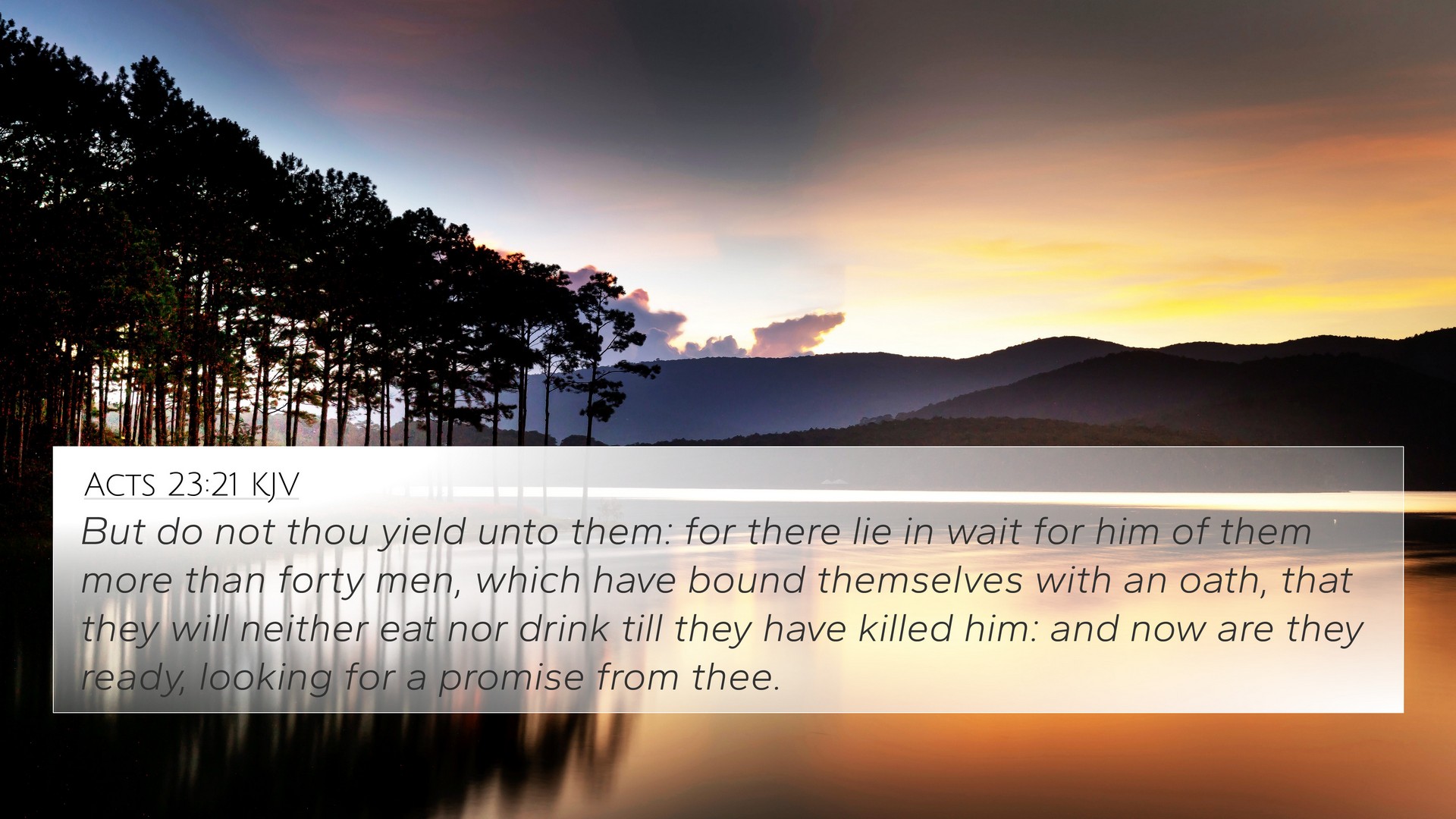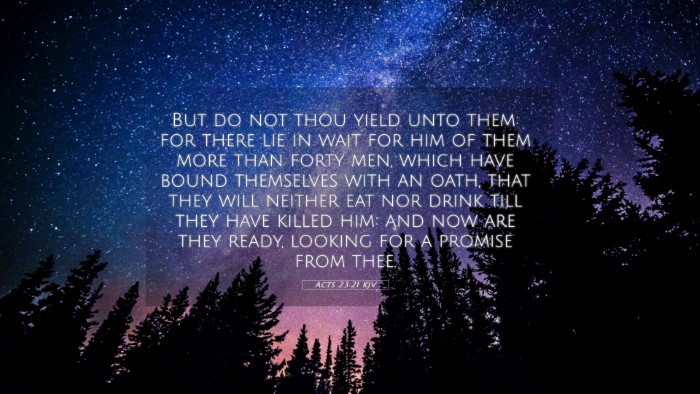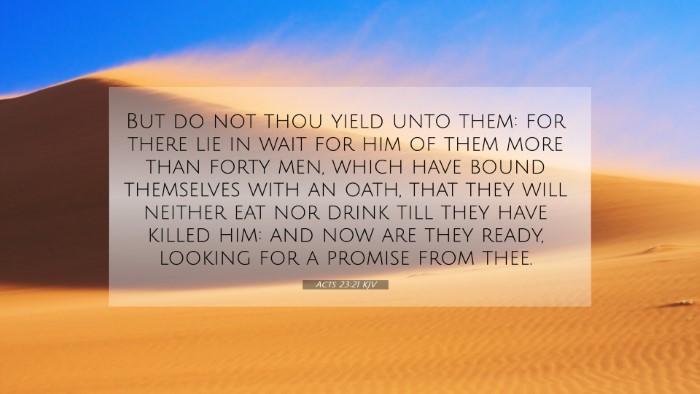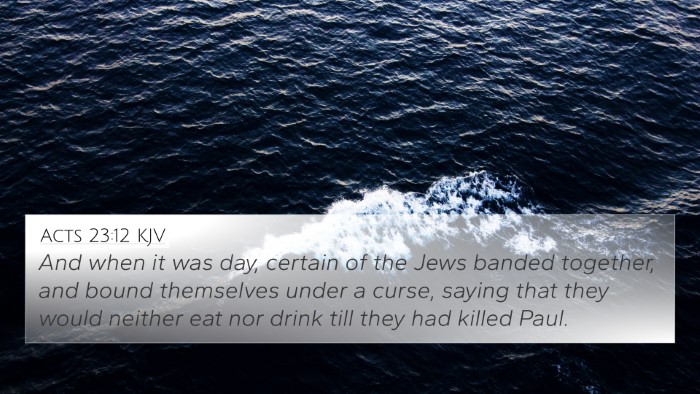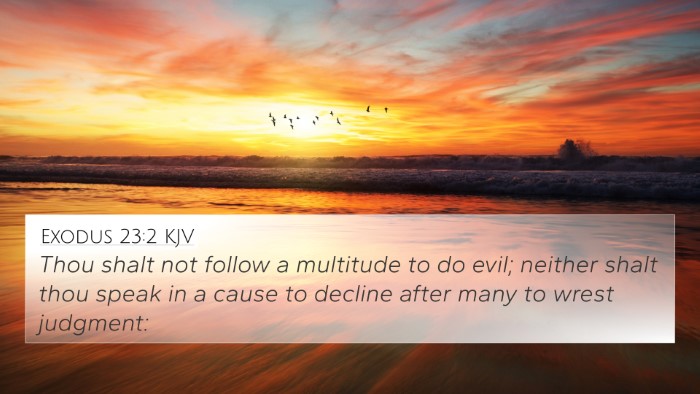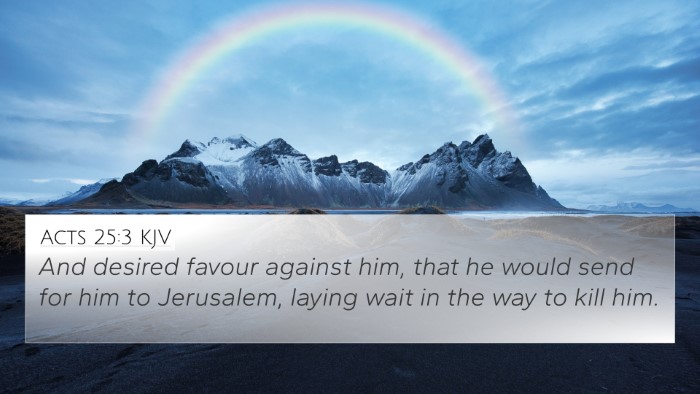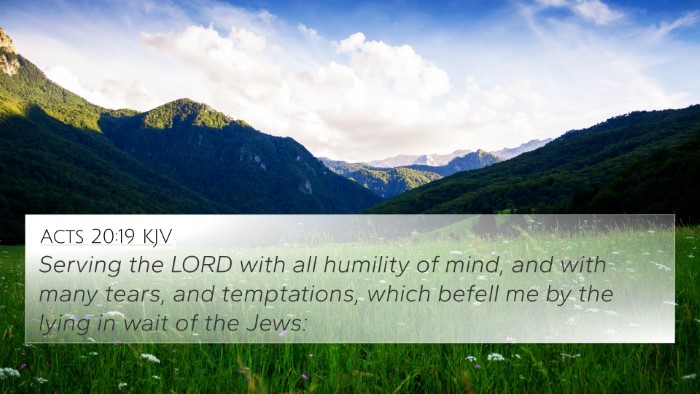Understanding Acts 23:21
Acts 23:21 states: "But do not yield to them, for more than forty of them lie in wait for him, who have bound themselves by an oath not to eat or drink till they have killed him. And now they are ready, waiting for the promise from you."
This verse is set within a dramatic context where a conspiracy is formed against the Apostle Paul, revealing the challenges he faced in disseminating the Gospel. The interpretations and commentary draw rich insights from public domain sources such as the works of Matthew Henry, Albert Barnes, and Adam Clarke.
Commentary Insights
Matthew Henry's Commentary
Matthew Henry notes that Paul's life was under imminent threat from a group of conspirators who had taken a vow. This reflects the intense opposition and peril that accompanied early Christian missionaries. Henry emphasizes the nature of the plot, revealing the seriousness of the threat against Paul’s life, and how it showcases the hostility faced by those who proclaim the Gospel.
Albert Barnes' Commentary
Albert Barnes elaborates on the conspirators’ motivations. Their determination illustrates the extremes to which men will go to silence perceived threats to their beliefs. Barnes points out that this event highlights the importance of being aware of spiritual and physical threats. The vow to fast until Paul's death shows a deep commitment to their cause and underlines the seriousness of the situation Paul faced.
Adam Clarke's Commentary
Adam Clarke remarks on the nature of oaths and vows within this context. He highlights the religious fervor of the conspirators and discusses the moral implications of their actions. Clarke emphasizes the significance of divine protection which runs through Paul’s experience, suggesting that God’s purpose cannot be thwarted by human schemes.
Bible Verse Cross References
Acts 23:21 can be cross-referenced with several other scriptures to deepen understanding and explore thematic connections:
- Acts 9:23-25 - Paul's earlier escape from a death threat illustrates the ongoing dangers he encountered.
- 2 Corinthians 11:24-27 - Paul recounts the numerous dangers he faced during his ministry, providing context for the threats mentioned in Acts 23.
- Luke 21:16-17 - Jesus predicts that His followers will be betrayed and face persecution, paralleling Paul's own experiences.
- Matthew 10:17-23 - Jesus warns His disciples about the persecution they will face, similar to what Paul experiences.
- Acts 21:30-31 - The uproar over Paul’s preaching leads to violence, foreshadowing the deeper threats against his life.
- Romans 8:31-39 - An assurance of God's protection and the ultimate triumph over adversities connects with Paul's trials.
- Psalm 37:32-33 - Reflection on how the wicked plot against the righteous, echoing the conspirators’ actions in Acts.
Connections Between Bible Verses
Cross-referencing Biblical texts such as those highlighted above reveals a rich tapestry of spiritual truths. The thematic connections between Paul’s perseverance and Christ’s teachings about persecution emphasize that believers can expect trials:
- Perseverance in Adversity: The consistent theme of enduring trials can be seen, such as in James 1:2-4, which encourages believers to count it joy when facing trials.
- Divine Protection: References like Psalm 91:1-2 reassure that those who trust in God find refuge and support amidst dangers.
- Purpose in Suffering: Scriptures such as 2 Timothy 3:12 remind believers that all who live godly lives will face persecution.
Tools for Bible Cross-Referencing
To delve into a deeper understanding of Scripture, utilizing tools for Bible cross-referencing can be beneficial:
- Bible Concordance: An index of biblical words that can aid in locating themes and connections.
- Bible Cross-Reference Guide: Provides lists of verses related to specific topics or themes.
- Cross-Reference Bible Study: Methods to explore interconnections within Scripture for personal growth or sermon preparation.
Conclusion
Acts 23:21 encapsulates a moment of intense adversity in the life of Paul, embodying the struggles faced by early Christians. Engaging with commentaries and cross-referencing other passages enhances the understanding of these trials and reassures believers of God’s providential care amidst opposition. Reflecting on such connections not only deepens knowledge but also enriches one’s spirituality by seeing the broader narrative woven through Scripture.
